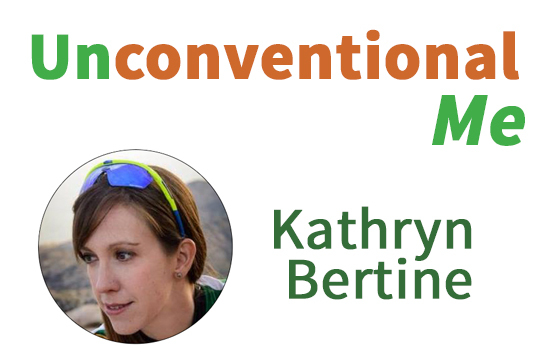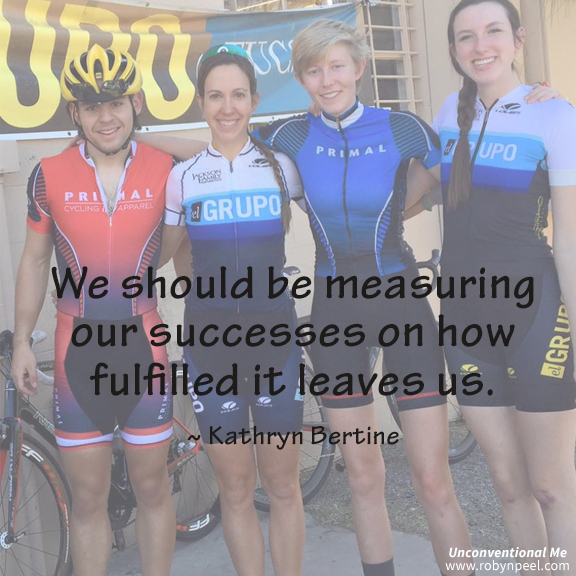Activist. Pro-cyclist. Film-maker. Author.
 Whatever job title you want to give Kathryn Bertine, she is one inspiring and committed woman. She took up professional cycling in her early 30s and quickly became involved in the campaign for greater equality in professional cycling. She was actively involved in the “Le Tour Entier” campaign which has led to the women’s race La Course happening just before the final leg of the Tour de France.
Whatever job title you want to give Kathryn Bertine, she is one inspiring and committed woman. She took up professional cycling in her early 30s and quickly became involved in the campaign for greater equality in professional cycling. She was actively involved in the “Le Tour Entier” campaign which has led to the women’s race La Course happening just before the final leg of the Tour de France.
I was so fortunate to speak to her one morning late last year after she’d completed a training ride in the Arizona mountains and was inspired by her commitment to making a difference and following her truth.
To listen to the full interview, click on the audio link below.
What fills your days at the moment?
My days are sectioned into three different realms. The first one is that I’m still racing professionally as a cyclist so one third of my day is focused on training, whether I’m out on the roads or I’m in the gym. I do get a small salary from pro cycling, but it’s too small to live from, so most every female pro cyclist has a second job to carry them through. The second part of my day is toward my actual job, working on marketing and media for El Grupo, a non-profit which gets underserved and underprivileged kids into cycling and into sports. And then the third part of the day is what I refer to as “my time” and for me, that’s been a lot of time toward activism, when I look for ways to advance the sport. So maybe I’m working on projects that have to do with getting better media opportunities for cycling, or I’m involved with writing projects and working on articles that might be geared toward women’s equality. It keeps me busy, but it’s also what I want to be doing. I think if you asked any activist how they structure their day, there definitely has to part of it based in the reality of what you need to make the other stuff happen.
I’m interested in two things you mentioned. Firstly, how long have you been a cyclist and has the activism always been there from a young age or has it come out in recent years?
I think the activism might have been there from a young age but I didn’t know it till later.
I can tell that what I’ve had since a small child is a focus on fairness. When something isn’t right or fair it has always aggravated me and I want to fix it.
People like to blame it on the world and say the world is sometimes unfair, but it is individual people who are usually unfair, not the entire world! It’s always people that stand behind an action. So if you can get the root cause of what is causing that unfairness then you have a good shot at changing that. That notion of wanting to create fairness has always been there growing up, although as a kid you don’t know how to articulate any of it. You just know when something is wrong or something is off.
I’ve been an athlete my whole life. I used to be a triathlete and before that I was a figure skater but I’ve been racing as a cyclist since 2007. The sports I played growing up had a pretty good level of fairness to them. In triathlon you race the same distance as the men. In figure skating there were boys and girls out on the ice together. So a very basic element of equality and fairness has been in most of the sports I’ve played. Granted, women’s sports definitely need more equality in the broadcasting realm so more people see it, but in playing those sports and competing in those sports there wasn’t a lot of inequity. And then I get over to the cycling world and it kind of baffled me.
Getting into the cycling world at the age of 31, I was now seeing it through the eyes of an adult and I didn’t find any good answers to the questions I had which largely revolved around, why are the women racing shorter distances than the men? Why do we have fewer race opportunities? Why is the prize money less? And why are the salaries almost non-existent and completely unequal to what the men are receiving? I couldn’t find a good answer to any of those questions, so that is what stirred the pot for me.
When you first get into a sport like cycling or triathlon you can’t just jump into it and change the whole system. You have to learn what’s working and what doesn’t work. You have to make the right connections with people and all of those things take time. You also have to be true to who you are. At the beginning if I had just jumped in cycling and started on the activism that first year when nobody knew me, I didn’t know anybody and I don’t really even know the sport, it wouldn’t have been a true effort.
If you really want to make a change in the world you need to understand what it is you’re trying to do; what it is you are trying to change. And that will take time and that’s a good thing because if you are truly passionate about what you believe in, then you are willing to do the work.
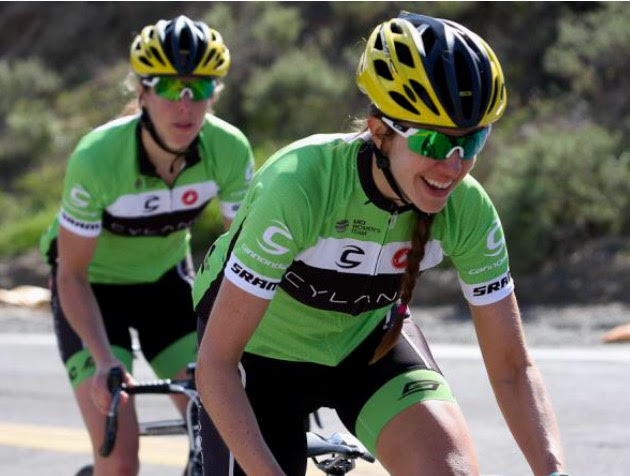
And where are you on the journey of change in women’s professional cycling at the moment?
It’s ongoing but the most rewarding thing is that we have made progress and we have made changes.
As any activist tells you, once you start seeing progress you only want to do it more. You only want to go after the hurdles and clear those hurdles even more. It’s been a long and difficult journey and you look at these arcane rules and backward philosophies and you just think why can’t other people see this and fix it immediately? Why does it have to take years for these changes to get passed?
But we’ve made some great progress. There are more women’s races being offered, distances are getting a bit longer and the age rule has been removed. We used to have this age rule that the average age of a pro team had to be no older than 28, which in endurance sports is crazy and doesn’t make any sense because the majority of women in endurance sports usually peak into their 30s and even their early 40s. We still have to work on media exposure, better TV and Internet packages built on not just women’s cycling but all of women’s sports. But to know that we have races that are happening simultaneously with the men’s fields is great. We still need more races and we definitely need more equity when it comes to salary and prize money but the good thing is that these things are now being talked about and people are figuring out how we can fix this.
What’s the most enjoyable part of your working day or week at the moment?
One of the most enjoyable things is seeing the trickle down effect of some of the movement we’ve started. Seeing that other people have been inspired to hold more races, to start up women’s cycling teams or maybe it isn’t even in cycling but people will say something like ‘you’ve inspired me create change in the area I’m passionate about.’ That makes me so happy. Just to get any sort of feedback that what you’re working on has mattered to someone else. That’s what I didn’t foresee as part of the activism. You’re so focused on pushing one particular agenda and you’re so focused to make it happen, and then you step back and you start getting messages from outside the direct arena and you realise you’ve had a bigger affect on certain parts of society. And that gives me so much joy.
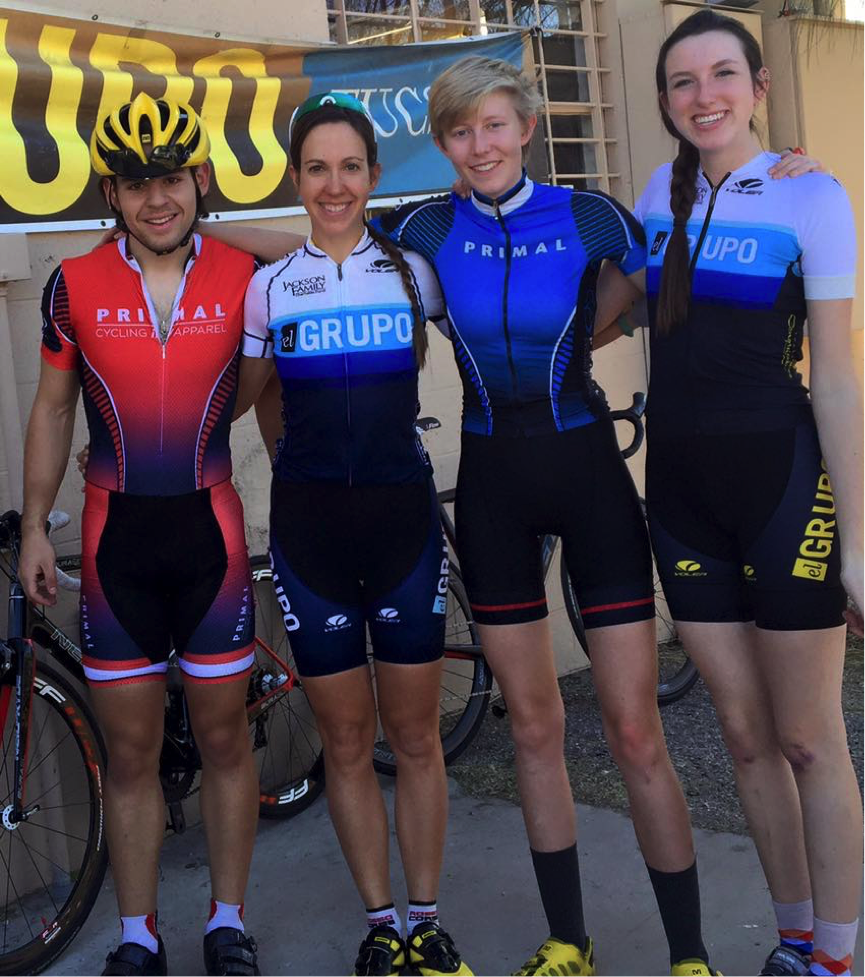
Have you always wanted to follow your own, non-traditional and unconventional career path?
In my early to mid 20s I thought I had to be on a certain track. You just get out of university and then you need a career. Then the next thing will be family. And then that’s how life continues. You know, that formulaic pattern we see so often. It’s not a bad track but it wasn’t a track I was geared for, but I didn’t know that at the time. So I was struggling because I knew I was being called and driven to something else but I don’t know exactly what that was yet. I did know I wanted to make a difference but at the same time I had to learn the ropes.
When I was around 27 or 28 I realised the traditional track wasn’t for me. After college I had found my way into triathlon and I’d shown some talent in the sport. It was clear to me that I had the ability to get to the professional level but I probably wasn’t going to be the best in the world. But I also felt it was my duty to be the best I could in what I tried to do. So here I am trying to make the professional level of a sport and in doing that had to take all these part-time jobs to make that goal happen, which I was fine with. It didn’t matter that I had a Masters degree, I was happy walking dogs and babysitting as long as it covered the bases for what it was I was trying to do.
But then on the other side of that you are getting close to 30 and society is saying, look at your friends they have typical jobs, they are getting engaged, some are even starting to have kids, they have dogs and cats and life looks tidy and neat. And they have a job where they don’t have to scrounge for lunch! So society was kind of pushing me to look at this picture and whispering ‘wouldn’t this be better or easier rather than flogging yourself for hours and hours to see if something may or may not happen?’ And I started to veer from my path for a little bit and there was even a time when I thought I’m going to quit triathlon, this isn’t working. When I made the decision to give up on the triathlon stuff and try to find something more traditional, things really started falling apart and I was just unhappy.
And finally I said to myself, let me get back to who I am and what I know.
When I made that decision to stay true to what I know and say I really want to be an athlete and I’m willing to do what it takes to make that happen, that’s when opportunities started coming my way again. ESPN called and I started working for them fulltime for two years and chasing my athletic dream. There truly is something in the universe that happens when you decide you want to stay true to who you are.
I’ll be the first to admit that you’ll still struggle…. It’s not always going to be easy to find the right jobs or whatever you have to do to live in order to do what you want to do. It can still be tricky and challenging, yet at the same time I do believe a lot of opportunities open up.
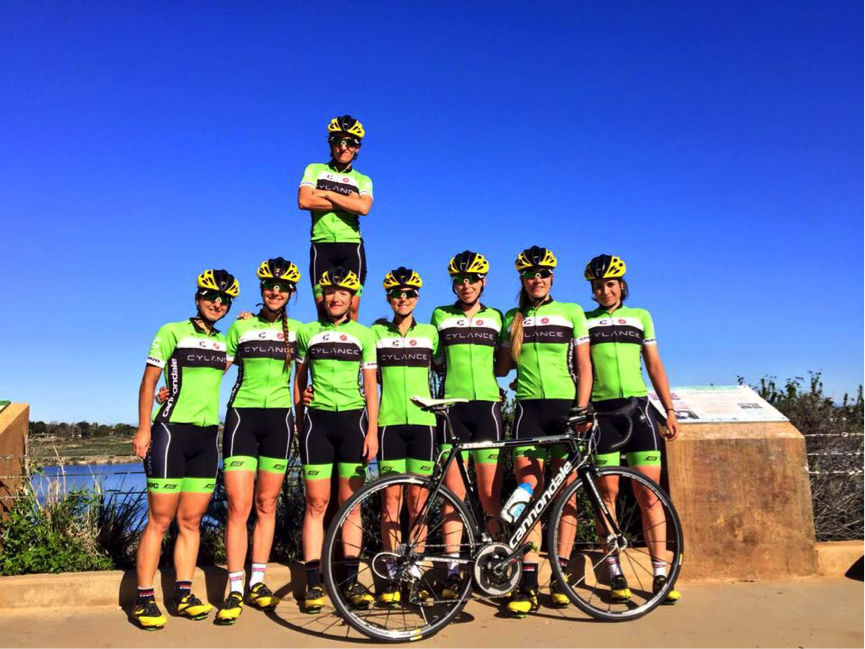
What’s been the biggest lesson to date?
The power of asking for what you need and what you want. It seems so very basic and almost trivial but it is the key! When I was making the film Half the Road and we were working on the Tour de France I had to ask the public for fundraising help and signatures of support in order to make my dreams and my passion come true. What was amazing was what I learned: That if you are able to show and articulate what it is that you are working on, what it is you are doing and how it will benefit not just you but more people, then you will gain a following once people trust what you are doing.
I learned that asking for those things and aligning yourself with the right people is the golden rule of the universe.
If you are willing to put in the work for what it is you are asking for, then amazing doors will open for you. People love helping people who will ultimately give back in some way. We have to ask and be willing to give when it’s our turn.
I don’t know how much I asked for in my early to mid 20s as I wasn’t really sure what to ask for or what to do with what I was asking for, so it didn’t work then. But what I did start to do then was surround myself with the right people. I knew that I had this strange goal-oriented, extreme personality of being focused and driven and in my 20s I started weeding through the friendship pool, to see whom I most aligned with and who else had that kind of energy and passion. If you surround yourself with the type of people you want to be like or who you are like, then that’s a very good start to a networking system. Get yourself a good niche of friends and colleagues and people that you admire, and build that in your 20s.
Who is your support network when times are tough?
I will be the first to admit that times have been tough. You go through a lot of personal things in your private life that can be difficult that you don’t necessarily put out there to the world. We are all human!
Whatever you’re trying to do in the public sector, like fighting for equality or whatever it is, you can’t do that to the best of your abilities if your private life is in turmoil or upheaval. And we all go through something difficult at some point in our lives. I have three or four core friends who I can call up and fall apart with and vice versa. They don’t know me as an activist or an athlete but as a human being. I have tons and tons of friends and colleagues on one level, but on a deeper level I have surrounded myself with a small handful of people that I have leaned on.
What’s next?
This coming year, 2016, will be my last year racing professionally, which is a really fun, happy and good decision for me. It’ll be my fifth year at the pro level so I’m really excited to give it my all and then retire and feel that I’ve done what I want to do in the sport.
I will always be an athlete but I won’t necessarily be doing it six hours a day! Once the professional realm has lessened my schedule I would really like to keep part of my activism focused on sport and moving all women’s sports forward. That is really important to me. But then the second thing I’d really like to get back to is my professional roots as a writer and a journalist as that’s where I feel I can give it forward. So ideally I can be working as an activist and working as a writer and a documentary film maker, combining those two worlds leaving me fulfilled with what I love to do, using the creative element.
You do have to find that thing that makes you feel fulfilled. That was always confusing to me too. People would always say “find your passion” and “only do what you’re passionate about.” And that’s wonderful and altruistic, but there is the reality of having to eat and pay rent and my bills! So I do want people to know that you don’t always have to have the two worlds aligned perfectly. Yes it’s great in a perfect world when passion and career align. But if you have to take a crappy job that gets you by so you can focus on the things that you love to do, that’s ok too. It’s just how you look at what fulfils you.
We should be measuring our successes on how fulfilled it leaves us. And it’s a hard thing to do in a society that constantly wants you to feel that monetary success is the only success that there is.
I know now more than ever that’s not the path, that’s not the way. And I can tell you that I have a lot of friends and colleagues who have gone that way and are very successful financially, but they are hollow and they are sad inside. I would rather be the opposite any day. I would rather be struggling a little bit financially but making something happen in the world or changing something and feeling good about that.
And finally, what career advice would you give to an 18-year old?
Be kind to yourself and be flexible. You might have a complete change in direction with what you want to do and that can be a very wonderful thing because it means something has come into your life where you’ve had your eyes opened to a new path. Allow yourself to think and dream that way. Even if you have been saying from the age of 3 years old that you want to be a doctor or you want to be a professional football player, if something all of a sudden looks more interesting to you, then allow yourself to try that new and interesting path and see what happens, because if that doesn’t work out you can go back to dream number one. But perhaps dream number two is trying to tell you something.
Also, sometimes it’s easier to figure out what you want by ruling out what you don’t want to do. Because you might not find that answer until you’re 30 or you’re 40 but along the way you are ruling out the things that don’t make you feel fulfilled. You’ll find it eventually but make sure you steer yourself toward the gut feeling. That’s what I tell my younger friends, listen to your gut and if something feels wrong or right, go with that even if you can’t articulate why. The gut doesn’t answer in full sentences, it just kind of tells you yes or no. And go with that. Don’t keep questioning why. Just say ‘ok, this doesn’t feel right’ or ‘this does feel right’ and try that.
For more information about Kathryn, check out her website: www.kathrynbertine.com or follow her on Twitter. A full listing of the books she has written can be found on Amazon.
You can also find more information about Kathryn’s Tour de France activism here and here.
